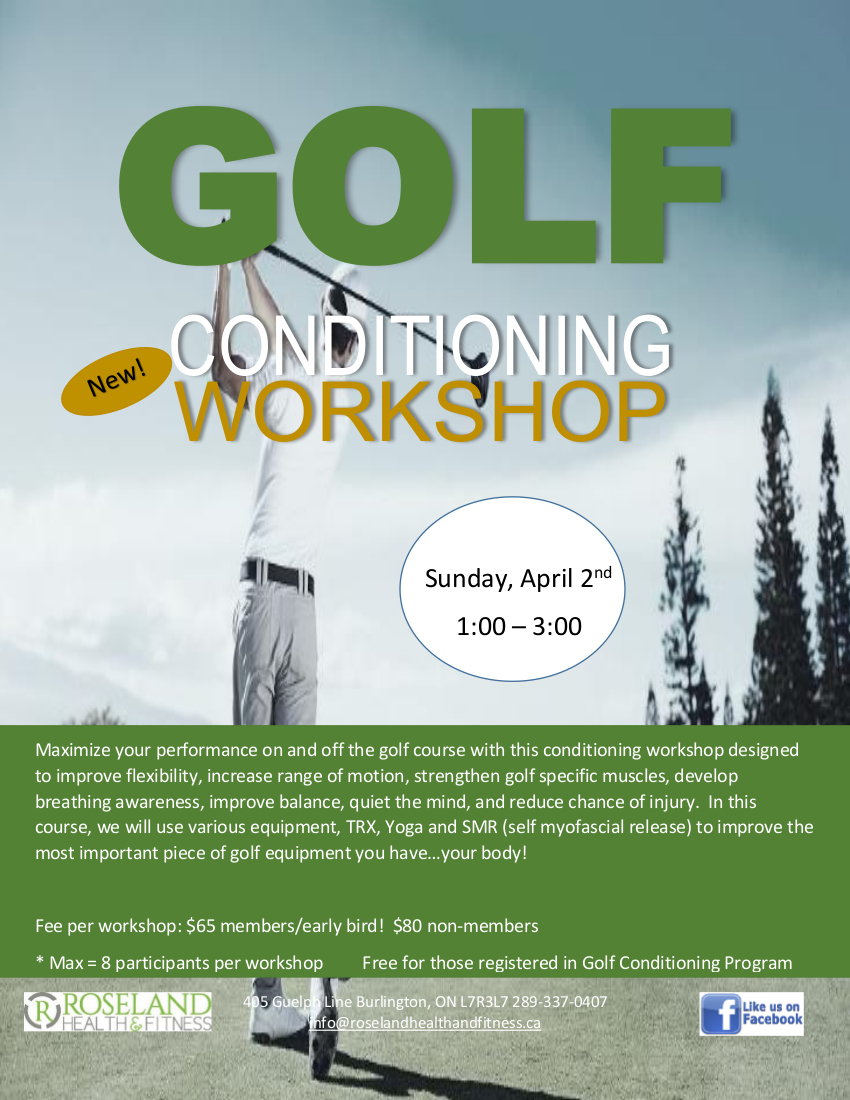Minimize Injuries and Enhance Performance with Customized Golf Fitness
Guest Blog: Roseland Fitness
It’s a physical game
The research evidence indicates that recreational golfers tend to sustain more golf injuries than professional level golfers and that more injuries occur as players get older.
Golf requires explosive power for driving off the tee and fairways. These repeated actions can put stress on the tissues and cause injuries. Golf injuries are mostly due to overuse, with lower back pain being the most common, and elbow pain, shoulder pain, foot pain and knee pain following closely behind.
Cross-Training to minimize injury
Your time on the course is precious. And, with a “short” season, you want to do everything you can to have an amazing, injury free season. Our advice? Incorporate golf specific cross training into your schedule this spring so you get into “golf shape” before hitting the course.
Cross training, with activities like yoga, Pilates and strength training, is the key to reducing the risk of injury, lowering your handicap and enjoying your game more.
Physical Requirements for Women vs. Men
When we decided to design a Golf Cross-Training Program for our members, we looked to the research of Dr. Wells, the Director of Sports Science for the RCGA (Royal Canadian Golf Association) and the Canadian Golf Association’s Men and Women’s National Amateur Golf Teams.
His latest research reveals some important, simple lessons. For starters, he concluded that for women, lower body power was the most important element of their ability to drive the ball. Interestingly, for men, leg strength was important, but arm and upper body strength were correlated with their ability to drive the ball. Dr. Wells also found that there was no relationship between core strength and driving speed and distance…but he did find that people with the strongest core strength have the least low back problems.
6 Pillars of Training for Golf
He also identified a number of critical fitness elements that can affect the ability of an individual to play golf, whether they have ambitions to play the PGA Tour one day or simply enjoy the game as a recreational pastime. He referred to these elements as ‘pillars’. Every Golf cross training program should include these 6 Pillars with age and gender specific training goals always taken into consideration.
These 6 pillar are
Balance
Flexibility
Posture
Core Stability
Strength and Power
Cardiovascular Fitness
One last element that we felt would round off Dr. Wells’ list is the practice of Mindfulness (loosely defined as a mental state achieved by focusing one’s awareness on the present moment). The game of golf is as much of a mental practice as it is a physical one so learning how to quiet the mind and be in the moment will help you not only reduce your handicap it may reduce your stress levels on and off the course!
If you are interested in finding out more about how to prepare physically to hit the links this spring, we invite you to join us for our Golf Conditioning Workshop being held on Sunday April 2nd 1 pm – 3 pm at Roseland Fitness.
